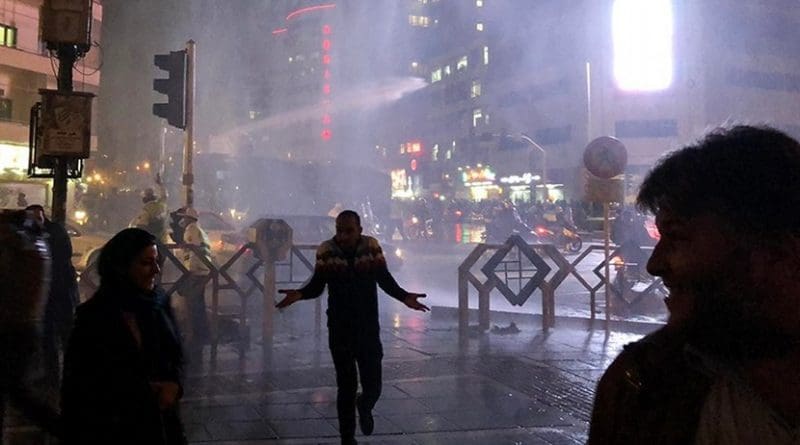Europe Must Align With US On Iran – OpEd
By Arab News
By Dr. Majid Rafizadeh*
Two brazen political assassinations are proof of Iran’s disregard for human rights and international law. While President Donald Trump may have his critics, his hard-line sanctions are the only kind of political message Tehran can understand.
One evening in November 2017, as Ahmad Mola Nissi returned to his home in The Hague, an assassin gunned him down in front of his door. A Dutch citizen of Iranian origin, the 52-year-old was a prominent figure in the Arab Struggle Movement for the Liberation of Ahvaz, an activist group that agitates for the formation of a separate state in western Iran. The government in Tehran has condemned the group as a terrorist organization. The Dutch authorities this month publicly announced for the first time that it had “strong indications” the Iranian government had commissioned the murder.
Nissi’s death is not an isolated case. Another of Tehran’s political opponents, Mohammad Reza Kolahi Samadi, was killed in similar circumstances in Amsterdam in 2015 due to his implication in a bombing in Iran in the 1980s. In fact, a series of assassination and terrorist plots across Europe and North America, some successful and others not, have been traced back to Tehran in recent years.
It seems that Trump’s heavy-handed methods have generated blanket criticism across large sections of the European media. Nevertheless, when it comes to Iran, the current administration’s policy has merit. The Joint Comprehensive Plan of Action (JCPOA), from which the US withdrawal prompted heavy censure from across the Atlantic, was fundamentally a flawed agreement.
Putting the brakes on Iran’s nuclear program should only have been a means to achieving the wider goal of curbing its regional ambitions. Western leaders’ focus on the narrow objective of checking Tehran’s arsenal — in which some arguably believe they have succeeded — came at the heavy cost of removing leverage on the country’s more immediately dangerous policies. By complying with the JCPOA, Tehran has earned itself a blank check to advance its aggressive, zero-sum policies across the Middle East. Desperate for the JCPOA to succeed, Western leaders sold it at too high a price.
The JCPOA was signed in 2015 and, since then, the Iranian funding and arming of Hamas, the Houthis and Hezbollah has substantially increased. The militant groups’ indiscriminate firing of rockets into other countries makes the possibility of peace in the region as remote as it has ever been. Meanwhile, it is the Iranian support of the Houthis in Yemen that has allowed that conflict to rage for so long. While the Arab coalition has unfairly borne the brunt of the international criticism for the humanitarian crisis in the country, the Houthis have actually been responsible for the war’s worst abuses, according to the UN, including the use of child soldiers, the rape of civilians and the employment of human shields.
Coming into force last November, Trump’s secondary sanctions have hit most of Iran’s major industries, including oil, shipping and banking. Commercial relations with all blacklisted entities are prohibited: Anyone who trades with Iran can no longer trade with the US. The method is draconian and the language unforgiving but, ultimately, this will significantly damage Tehran’s ability to conduct its regional program. It will win the US back its leverage.
With Iran’s political meddling occurring so far from home, it is unsurprising that the EU has been hesitant to abandon the JCPOA . But the accusations of the Dutch government should serve as a wake-up call to policy-makers. The murders of Nissi and Samadi can leave no doubt as to the nature of the state that the EU is continuing to tolerate. It is inconceivable that Europe should choose to side with a rogue state over its oldest and closest ally of the past century.
Tehran is benefiting from the disunity in European and US policy and, if the EU does not change its position, we can expect more political assassinations over the coming months and years. A united front, comprising joint sanctions, would send a clear message and engender an economic stranglehold that would force Tehran to concentrate on its domestic agenda.
On Jan. 8, the EU did announce a positive step. In light of the Dutch revelations, minor sanctions were imposed on sectors of the Iranian Ministry of Intelligence, as well as on Saeid Hashemi Moghadam, the deputy intelligence minister. However, these do not go nearly far enough, particularly if the EU is inclined to continue its support for the JCPOA. Iranian violations will continue and the stability of the Middle East will continue to suffer as Tehran pursues its subversive agenda.
The EU must commit itself to meaningful joint action with its transatlantic partner to put a stop to this rogue behavior.
• Dr. Majid Rafizadeh is a Harvard-educated Iranian-American political scientist. He is a leading expert on Iran and US foreign policy, a businessman and president of the International American Council. He serves on the boards of the Harvard International Review, the Harvard International Relations Council and the US-Middle East Chamber for Commerce and Business.

